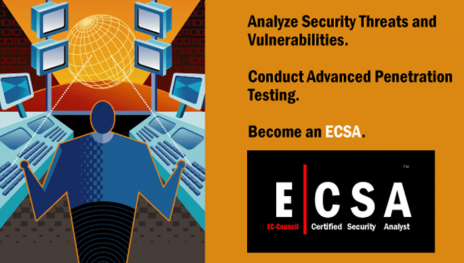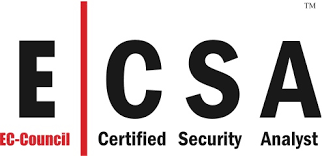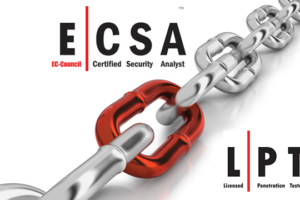
St. Louis, MO, February 12, 2017 – Alpine Security (“Alpine”), an EC-Council Accredited Training Center, adds the EC-Council Certified Security Analyst (ECSA) Certification Training to their offerings. Alpine’s Daniel “Doc” Sewell, a Certified EC-Council Instructor (CEI), and Alpine’s primary ECSA instructor, provided answers to common questions about the ECSA Certification and training:
What does the ESCA course cover?
The Certified Ethical Hacking (CEH) course introduced students to the methods and tools used by real “black-hat hackers” to attack computer systems. The ECSA certification covers many of the same topics as the CEH, but it does so much more in depth. The ECSA Penetration Testing methodology is introduced to give students a structured, rigorous framework that they can follow for their own penetration tests. The course also includes the necessary knowledge for negotiating and documenting contracts with customers for penetration tests.
Who benefits from ESCA training?
The ECSA is a great next-step beyond CEH for professional penetration testers or those who will be managing them. The ECSA prepares the student for roles such as Lead Penetration Tester and Red-Team Manager.
Why is ESCA training important?
Knowledge is good, but being able to apply that knowledge to real-world scenarios is even more important. The ECSA’s hands-on component demonstrate that the student has the ability to take the knowledge of penetration testing concepts and use and adapt them in a real penetration test, to help their customers find and fix the holes in their security before the bad guys do.
What are the benefits of having ECSA Certification?
EC Council is known around the world as a provider of solid cyber security training. The CEH is recognized and required for many cyber security jobs, such as those in the US government and the US military. The ECSA certification demonstrates that the holder has the proven ability to apply penetration testing knowledge to real-world scenarios.
What do you have to do to get certified?

The ECSA is a five-day course that is about 50% lecture and demonstration and about 50% hands-on. The course includes 30 days of iLabs Cyber Range access, which allows the students to practice techniques in a safe, legal environment, which can be accessed anywhere with Internet access from a web browser. In order to be allowed to take the written exam (a four-hour, 150 question exam, 70% passing score required), the student will be required to complete twelve “challenges,” which are designed to mimic a real penetration test. The student will then complete a realistic penetration test report on the challenges. Once the student passes the hands-on challenges, then he or she will be allowed to schedule the written examination. When the student passes the written examination, then he or she will be awarded the ECSA certification.
About Alpine Security
Alpine Security, a Service Disabled Veteran Owned Small Business, provides cybersecurity certification training, customized and private technical training, penetration testing, and incident response. Alpine Security’s cybersecurity training can be taken Live Online or In-Person. Alpine Security is based in St. Louis, MO.
About Daniel “Doc” Sewell
Daniel “Doc” Sewell works as a Senior Cyber Security Engineer for Alpine Security. He currently holds multiple cybersecurity certifications, including EC Council Certified Security Analyst (ECSA), Offensive Security Certified Professional (OSCP), Certified Information Systems Security Professional (CISSP) and Certified Secure Software Lifecycle Professional (CSSLP). Doc’s cybersecurity experience includes penetration testing a fighter jet embedded system, penetration testing medical lab devices, creating phishing emails and fake web sites for social engineering engagements, and teaching security courses to world-renowned organizations such as Lockheed Martin and the Hong Kong Police Department. Doc’s hobbies and interests include home networking, operating systems, computer gaming, reading, movie watching, and traveling.



